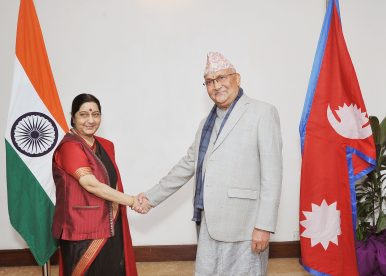By Kamal Dev Bhattarai
With Indian Minister for External Affair Sushma Swaraj’s sudden visit to Kathmandu on Februray 1-2, there are signs of a rapprochement between Nepal’s newly elected Left Alliance and New Delhi.
For the Communist Party of Nepal (Unifed Marxist-Leninist) (CPN-UML) leader (and presumptive prime minister in the new coalition government) K.P. Oli, a friendly relationship with India is must. Two-thirds of Nepal’s trade is with India; the country is heavily dependent on its larger neighbor to








/arc-anglerfish-arc2-prod-mco.s3.amazonaws.com/public/CSX2YUKTARH2PC7ZAZDWHYBG4A.JPG)

/arc-anglerfish-arc2-prod-mco.s3.amazonaws.com/public/XCUNO3YAJJCSVLMRJQXDGPTLH4.jpg)
